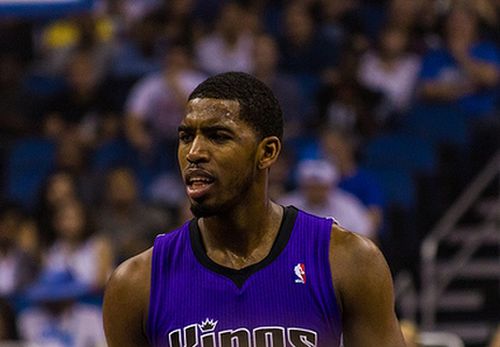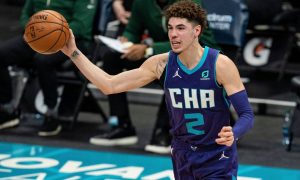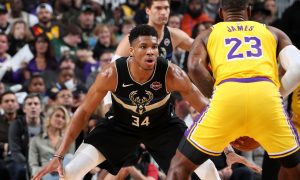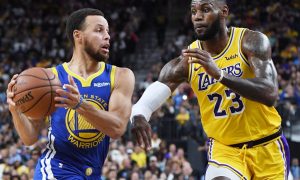
Image courtesy of RMTip21 | Flickr
With the signing of a new point guard in Darren Collison and a decreased attachment to Isaiah Thomas, the Sacramento Kings front office will now look to address the power forward position, one of the team’s biggest issues.
Only a few standout fours across the league can be named. It is one of the least star-heavy spots on the floor, but it is a crucial one nonetheless. For the Kings, it’s one of the positions holding the team back from becoming a playoff-contending franchise.
The Kings are not short of power forwards by any means. In fact, with the amount of players at the position, one would think to see a star or two in the mix. However, the team has huge money tied up in players who have not produced in the past and who may be doomed to do much of the same in the following years.
For a majority of the 2013-14 season, Jason Thompson was the starting power forward, with Reggie Evans coming off the bench to do nothing but rebound the ball ferociously, even if it killed him. Thompson is a lackluster player and not an NBA starter. Other than putbacks and some defensive rebounding, he has virtually no power on the defensive side of the ball and is ignored consistently by opposing bigs who float their way around him, much to the chagrin of DeMarcus Cousins, who has yet to see a good starting power forward for the Kings.
Last summer, the team signed 30-year-old Carl Landry to a four-year, $26 million contract, failing to see the aging and declining player’s risks. Between Landry’s huge contract and the 5 year, $30 million deal the team gave Thompson to begin the 2012-13 season, the Kings can expect to pay upwards of $37 million to these to players alone, holding them back from signing players to bigger, long-term contracts. All this for an injury-prone, defensive risk and a four who cant step out past the free-throw line.
Along with Landry and Thompson are Evans, Quincy Acy and Derrick Williams. These three players should be considered of higher value to the Kings than Landry and Thompson. Acy provides the team a spark off the bench and doesn’t take up much in cap space with a contract under $1 million that ends after next season. He’s a cheap player who can provide some decent backup minutes and give the team some lift when he steps on the floor.
Evans is the best rebounder on the team and one of the best league-wide, and the 34-year-old, 12-year NBA veteran’s contract is just over $1.7 million for next season. Again, this isn’t a stretch for Pete D’Alessandro and the Kings for the rebounding production and backup minutes Evans provides. If the team manages to move both Landry and Thompson, which likely won’t be until the middle of the season, at the earliest, than Evans’ minutes and production would rise steadily.
The power forward of the future for the Kings should be Williams. He’s owed approximately $11 million over the next two years, a figure that matches Williams’ talent level far more than Thompson’s or Landry’s. Williams is the team’s most athletic and explosive player, he’s dangerous in transition and, if given a full-time starting job as a stretch four, his value would skyrocket. Sacramento needs his floor spacing to give Cousins room to work in the paint, and Williams’ consistent ability to create his own shot and even hit pull-up jumpers displays what his offensive game could become.
The Kings would be well-served to trade Thompson and Landry’s contracts, attaching a couple of players to sweeten the deal for prospective teams involved. No team would take Landry’s contract for a player straight-up, unless the aforementioned party’s contract promised a sum relatively close, but this would put the team back to square one with an equally poor agreement. Ben McLemore will likely be involved in numerous trade rumors and opportunities in the future, as his rookie contract and apparent upside may be thrown into a deal to get rid of Landry or Thompson and clear up some cap space.
It’s out of necessity that the Kings will overhaul the power forward situation and clear out some cap space in the process. If the organization hopes to become a winning team in the not-so-distant future, it needs to have the resources to sign valuable players. As it stands now, Thompson and Landry do not provide enough output to make either worth the money they’re owed by the Kings.
Improving the team’s power forward position will likely be the front office’s next task, and it’s a necessary one to make a run at success in the future.


















